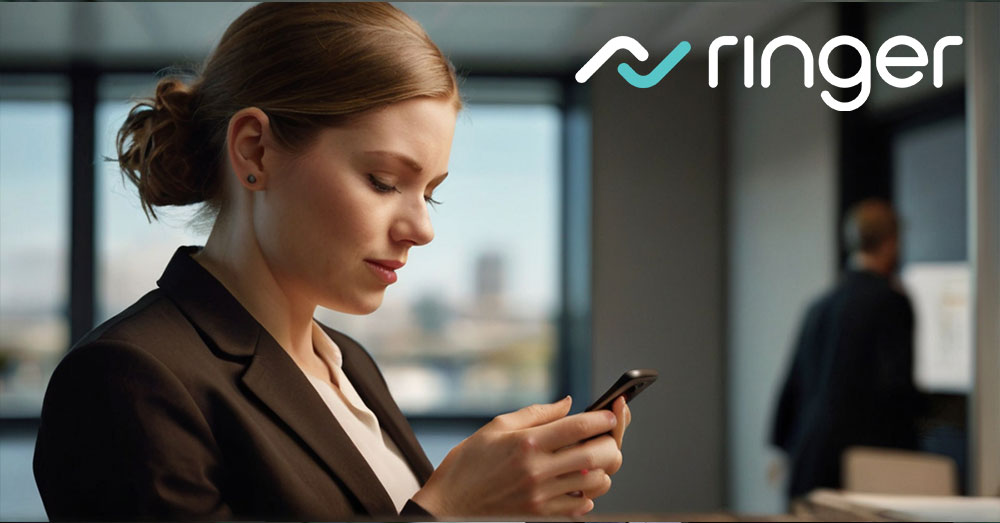
April 1, 2024
Business vs. Personal: Where Do Employers Draw the Line on Mobile Phones at Work?
Looking around the office, my colleagues are using their computers and mobile phones to communicate with teammates, partners and customers. Desk phones are nonexistent. Smartphones have become standard in most professions, many of them personal devices rather than corporate owned. In company workplaces and offsite, they are the go-to tool for employee communication and productivity. According to some reports, two-thirds of American employees use their cell phones several times a day at work (Zippia).
Clearly, this presents challenges for employers, as they are forced to navigate the boundaries between work-related activity and personal use. Getting the most benefit from mobile technology is a delicate balancing act that requires respect for employees’ personal privacy as well as control over important business communications. Deciding where to draw the line on employee mobile phone usage in the workplace is not an easy or straightforward task. However, striking the right balance is important for creating a positive culture that results in productivity, efficiency and security in the modern workplace.
Finding the Line
Employers can benefit from leveraging mobile technology for communication and collaboration within their organizations. But letting personal devices into the workplace means they are also vulnerable to new risks, including lower productivity due to personal distractions and higher security exposure due to non-compliant devices connecting to the corporate network. Businesses should seek to empower employees with the communication tools they need to succeed while maintaining control over productivity and security in the workplace. Because every company is unique, finding the line where employee happiness and productivity intersects with corporate needs for security, control and visibility, will be a different experience and outcome for every business.
Establishing the Rules
Setting and communicating clear policies around mobile phone usage at work is essential for employees to be able to achieve goals and expectations. Specific policies will vary by organization but should define expectations for acceptable mobile phone use, including restrictions on personal communications during work hours and guidelines for handling sensitive information. For example, organizations may state specific limitations on personal calls, text messages, social media, and non-work-related application usage during work hours. Allowance for personal use during the workday may be reasonable and help to respect employee needs. By setting clear boundaries, employers can minimize the risk of security breaches and maintain high productivity levels.
Taking Precautions
In addition to creating policies, employers should be proactive about cybersecurity because personal devices accessing company networks or storing sensitive information may become vulnerable to cyber threats, data breaches and unauthorized access. In today’s world, it’s not if an organization will experience a cyber-attack but when. Organizations must strengthen their network and applications with strong security solutions, such as encryption, mobile device management (MDM), and employee training programs to reduce these risks. By doing as much as possible to safeguard sensitive data, employers are in a stronger overall position and can more safely leverage the benefits of mobile technology at work.
Fostering Trust and Accountability
In today’s world, where the line between business and personal life is more flexible, maintaining control over communications on mobile phones requires a culture rooted in trust and accountability. Employers should communicate often and be clear about mobile phone usage expectations, while also holding employees accountable for following the company policies. Organizations that allow for some flexibility when it comes to usage, will learn that trust is a two-way street and be able to create more respect from employees. For example, recognizing that employees may need to attend to occasional, time-sensitive personal matters during work hours, can help employers to establish guidelines that allow for reasonable use of mobile devices while maintaining productivity and professionalism. Ultimately, by nurturing an inclusive and responsible culture, backed by mutual respect, employers can empower employees to use mobile technology effectively while minimizing risks to the business.
While employers have strong motivation to leverage mobile phones in the workplace with efficiency and productivity gains, it’s important to weigh the corporate need for control, with respect for employee’s personal boundaries and privacy rights. Policies that go too far in restricting personal phone use may result in unnecessary employee resentment. Whereas employers that set out to create a culture of mutual trust and accountability can succeed in gaining the full potential of mobile technology in today’s digital workplace. Striking the right balance between connectivity and control will help employers maximize the benefits of mobile technology.
As the business world continues to integrate personal mobile phones into the workplace, innovations will emerge that provide solutions to today’s challenges. Ringer will soon be leading this charge by helping employers meet today’s workforce needs with a game-changing corporate phone service that streamlines work and life for mobile employees. Sign up to receive updates and be among the first to learn more about what Ringer is bringing to market: https://www.ringer.tel/#Contact
Kerry Garrison brings more than 34 years of marketing and technical expertise to his role at Ringer. Responsible for planning, building and executing marketing campaigns to expand Ringer’s reach, Kerry understands the industry landscape and is an expert at delivering solutions that solve customer challenges.
Kerry serves as director of product marketing at Teliax, a national CLEC that pioneered business VoIP and has held executive roles at companies such as 888VoIP, XO Communications, Inc. and Vitelity.
Kerry is a graduate of Irvine College with a BS in Business Management.